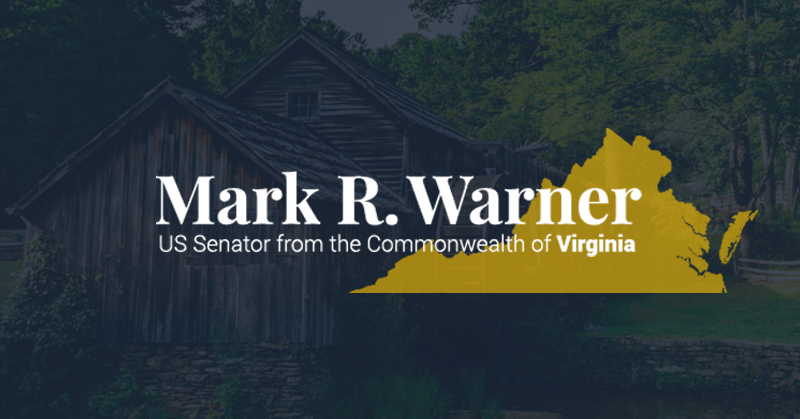Source: United States Senator for Commonwealth of Virginia Mark R Warner
WASHINGTON — U.S. Senators Mark R. Warner (D-VA) Chairman of the Senate Select Committee on Intelligence and Marco Rubio (R-FL) Vice Chairman of the Senate Select Committee on Intelligence, sent a letter to the U.S. Trade Representative, Ambassador Katherine Tai, highlighting the importance of reconvening trade agreement talks with Taiwan.
“We respectfully request that you prioritize these talks and take steps to begin laying the groundwork for negotiation of a free trade agreement (FTA), or other preliminary agreement, with Taiwan,” the Senators wrote.
“Taiwan is the tenth largest trading partner of the United States—surpassing more populous nations such as India, France, and Italy—and the eighth largest market for American agricultural products. It embraces high standards of labor rights and environmental protection. We can all be confident that an agreement negotiated with Taiwan could serve as a model for what a high-standard FTA should look like,” the Senators continued.
“Beyond commerce and investment, Taiwan has proven itself to be a true friend to the United States and a model of a vibrant democracy. While Chinese authorities denied American companies operating in China the ability to send personal protective equipment (PPE) back home during the pandemic, Taiwan stood up production lines of PPE for the United States when we were most in need,” the Senators concluded.
Joining Warner and Rubio in sending the letter were Senators Jim Inhofe (R-OK), Kyrsten Sinema (D-AZ), Thom Tillis (R-NC), Cory Booker (D-NJ), Marsha Blackburn (R-TN), Chris Coons (D-CT), Shelley Moore Capito (R-WV), Joe Manchin (D-WV), John Boozman (R-AR), Tim Kaine (D-VA), Tom Cotton (R-AR), Kevin Cramer (R-ND), Roger Wicker (R-MS), Todd Young (R-IN), Steve Daines (R-MT), Rick Scott (R-FL), Ben Sasse (R-NE), Cindy Hyde-Smith (R-MS), John Barrasso (R-WY), John Thune (R-SD), Tim Scott (R-SC), Mike Braun (R-IN), Roy Blunt (R-MO), Mike Lee (R-UT), Chuck Grassley (R-IA), John Cornyn (R-TX), Lisa Murkowski (R-AK), Mike Rounds (R-SD), James Lankford (R-OK), Rand Paul (R-KY), Lindsey Graham (R-SC), Deb Fischer (R-NE), Dan Sullivan (R-AK), Ted Cruz (R-TX), John Hoeven (R-ND), Roger Marshall (R-KS), Cynthia Lummis (R-WY), Susan Collins (R-ME), Pat Toomey (R-PA), and Bill Hagerty (R-TN).
Dear Ambassador Tai:
As you move to establish your early priorities, we are pleased to see that the resumption of talks with Taiwan under the Trade and Investment Framework Agreement (TIFA) is among your areas of focus. The last TIFA meeting was held in October 2016, which is far too long ago when one considers Taiwan’s importance as a trade partner to the United States. For this reason, we were gratified to see reports that you held a virtual meeting with Taiwan’s top trade official, John Deng, on June 9, 2021 and committed to reconvene TIFA talks in the coming weeks. We respectfully request that you prioritize these talks and take steps to begin laying the groundwork for negotiation of a free trade agreement (FTA), or other preliminary agreement, with Taiwan.
In August 2020, Taiwan’s President Tsai Ing-wen announced her intention to remove, and later removed, what had been a major obstacle to the pursuit of a FTA: import restrictions on certain U.S. beef and pork products. It is now time for the United States to reciprocate and begin negotiations. It is clear that the United States stands to gain much in doing so.
Taiwan is the tenth largest trading partner of the United States—surpassing more populous nations such as India, France, and Italy—and the eighth largest market for American agricultural products. It embraces high standards of labor rights and environmental protection. We can all be confident that an agreement negotiated with Taiwan could serve as a model for what a high-standard FTA should look like. It will facilitate free trade under fair conditions that allow American workers, producers, and companies alike to flourish. Advanced economies such as Singapore and New Zealand have paved the way by signing their own FTAs with Taiwan.
Beyond commerce and investment, Taiwan has proven itself to be a true friend to the United States and a model of a vibrant democracy. While Chinese authorities denied American companies operating in China the ability to send personal protective equipment (PPE) back home during the pandemic, Taiwan stood up production lines of PPE for the United States when we were most in need. Despite Beijing’s endless efforts to isolate and bully, Taiwan remains everything we want the Indo-Pacific region to be: a democratic, free market economy that is a reliable partner to the United States. Lastly, trade talks with Taiwan are also of great strategic importance. Maintaining U.S. economic influence in the region and reducing Taiwan’s dependence on China is essential to ensuring that the region remains free and open.
Thank you again for committing to resume TIFA talks with Taiwan in the coming weeks. We appreciate your continued attention to this important matter.
Sincerely,
###
